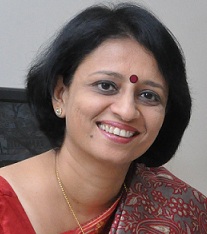|
Our Guest
Editor,
Sudeshna Chatterjee
Principal,
Jamnabai Narsee School
 "The
21st century city bred children
have - passionate pastimes -
surfing the net, watching
television or engaging in wars,
battles and races on their PS3's
and other gizmos. "The
21st century city bred children
have - passionate pastimes -
surfing the net, watching
television or engaging in wars,
battles and races on their PS3's
and other gizmos.
The
lack of playgrounds and safe
areas make it almost impossible
for them to choose other outdoor
pastimes.
Parents,
worried about congestion,
traffic issues, stalkers and
kidnappings are more than
comfortable with the child
spending play time at home,
hooked to a gadget.
Children may become less
sensitive to the pain and
suffering of others.
Children may become more fearful
of the world around them.
Children may be more likely to
behave in aggressive or harmful
ways toward others.
'Chota
Bheem' is so cute in his
escapades, but the
boisterousness and rowdy
behaviour of the well-loved
characters in these televised
serials and films are actually
passing off as acceptable
behaviour, many socially
unacceptable demeanours.
Negative
Effects of Video Games
o
Children who play violent video
games are more likely to have
increased aggressive thoughts,
feelings, and behaviours, and
decreased pro social helping,
according to a scientific study
(Anderson & Bushman, 2001).
o
In many games, children are
rewarded for being more violent.
o
Active participation in
on-screen violence, repetition
and reward, are effective tools
for learning behaviour.
o
Too much video game playing
makes the child socially
isolated. Games can confuse
reality and fantasy.
o
Academic achievement may be
negatively related to over-all
time spent playing video games.
o
Video games may also have bad
effect on some children's
health, including obesity,
video-induced seizures,
postural, muscular and skeletal
disorders, such as tendonitis,
nerve compression, carpal tunnel
syndrome.
o
Playing online may make your
child vulnerable to online
dangers.
o
It increases their depression
and anxiety levels.
o
Children spending too much time
playing video games may exhibit
impulsive behaviour and have
attention problems.
Can
we revert to the days of parents
sitting with their children,
reading together? Let the child
pick up the nuances of the
language, love for words,
pictures, situations and
characters while exploring the
world through the parents tales
and attractive story books. The
reading habit acquired in
childhood can become a lifetime
hobby. Later, the story book can
give way to the study book.
Think
about it
|